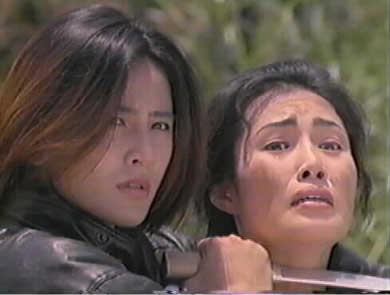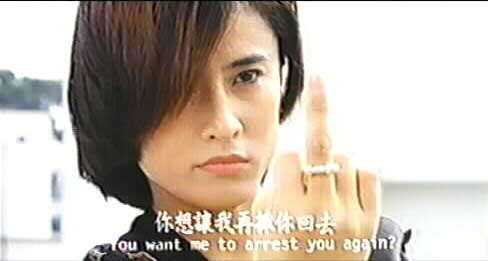


Yukari’s finest performances have been either stolen from brief opportunities (e.g., “Angel,” 1987, “Final Run,” 1989, “Close Escape,” 1989, “Godfather’s Daughter’s Mafia Blues,” 1991, “Dreaming The Reality,” 1991, “The Story of Ricky,” 1992, “Beauty Investigator,” 1992) or have emphasized suffering and personal torment (“A Punch To Revenge,” 1989, “Never Say Regret,” 1990, “Angel Terminators II,” 1993, “Vengeance Is Mine,” 1997).
Yukari’s best screen partnerships were with Mok Siu Chung (Max Mok) (“Close Escape,” 1989, “Never Say Regret,” 1990, “That’s Money,” 1990, “The Golden Nightmare,” 1998) and Wai Tin Hung (Clare/Clara Wai) (“Burning Ambition,” 1989, “Never Say Regret,” 1990, “That’s Money,” 1990). There was real screen chemistry between these three and all these movies are well worth watching.
However, the director extracting the absolute best from Yukari (Simon Yun Ching) teamed her with Moon Lee and Sibelle Hu (Hu Hui Chung) in the action thriller “Dreaming The Reality” (1991) and its dark sequel “Angel Terminators II” (1993). Both movies trace the fate of two couples. In each case one pair (Yukari and Moon Lee) live outside the law, while the other (Sibelle Hu and her male co-star) attempt to uphold it. All are eventually undone by the interplay of inner conflicts or urges and outer forces. Simon Yun Ching adds several subtle layers that merit repeated viewing. All the principal characters have people close to them who care about them, and offer the prospect of normal lives. Yet, in various ways they ignore these opportunities and instead listen to their inner demons.
In addition to more typical passions and appetites, these movies allude to states of posttraumatic stress and dissociation (Moon Lee in “Dreaming”) versus anger management and impulse control problems (Yukari in “Angel Terminators II”). In each film Moon and Yukari, respectively, overlook relationship opportunities with men who, quite literally, sacrifice their lives for them. Hints of a symbolic undercurrent of bisexuality run through these films. Yukari’s death scenes are disturbingly sensual in both movies, filmed in slow motion with careful attention to detail. She gives herself for Moon both times. She immediately gives up her life at the moment Moon’s character rejects her. When she’s dead, the passion is gone. Only the pain remains, and Moon Lee and Sibelle Hu dish it out. Complemented by a good score, intelligent camera work and an excellent cast, “Dreaming” is a cult classic set in Thailand that combines psychological sophistication and 80’s-chic costume fetishism reminiscent of “Miami Vice.” “Angel Terminators II” (1993) is possibly Yukari’s best movie of all, in which her angry, leather-jacketed persona burns brightly, then flames out in a series of nihilistic gestures rich in subtext. See these two films!
Other signs of Simon Yun Ching’s work are evident
in “Mission of Justice” (1992) when Yukari gets knocked down, bloody, in
a hotel stairwell, or rolls her eyes while dancing with some man she could
care less about. In “The Story of the Gun” (1992) her character is
both attractive and morally repellant. She switches allegiance from
her boyfriend to his bodyguard when he seems more likely to assist her
escape from the Mainland. She is also particularly ruthless in this
production, breaking one man’s neck, shooting another with the gun pressed
against his torso, and stabbing a dying woman with a jagged shard of wreckage.
Although not the director’s best work, these movies nevertheless rise,
in places, above mere actioners due to such glimpses.Yukari’s presence
in so many movies is so ubiquitous (and under-acknowledged) that reference
sources have, on occasion, mistaken her for other more famous action stars
- male as well as female! For example, in a still photo she has been
mistakenly identified as Michelle Yeoh (Asian Cult Cinema, p. 160), while
her fight scene in “Millionaire’s Express” was mistakenly attributed to
Yasuaki Kurata’s swordsmanship in “The Best of the Martial Arts Films.”
Faint ripples of Yukari’s direct influence have reached as far as American television, through the stunt double work of her protege Sophia Crawford, and her own film work has been cited as a possible model for promoting the sport of women’s boxing. She was active as a martial artist and action star a decade before female action leads became popular in the West. Yukari’s film career probably represented few larger messages or themes, although when she is considered alongside her contemporaries, the very hard, androgynous edge she brought to many of her characters seems quite distinctively hers. It is this quality that elevates her brief screen appearances.
At her best she displayed a ferocious physical talent that, in conjunction with intense focus and control, reflects the Japanese martial art tradition, as well as the other forms that influenced her. She never had the opportunity to act in lavish productions with elaborate special effects. Instead, she introduced intensely personal violence to ordinary situations. Scenes such as a woman approaching middle age wearing military camouflage stabbing a bad guy in the neck then watching coldly as he bleeds out in a carotid spray (“The Golden Nightmare,” 1998), or a younger business attired woman yelling (in English!) “Get the fuck out of here” while literally kicking a colleague through her office door with a crescent kick to the face (“Spiritually A Cop,” 1991) are uniquely Yukari’s. Such moments are enhanced by knowledge of her emphasis on full contact realism. Her characters typically don’t sing, dance or please others. Apart from thoroughly trashing gender role stereotypes, in her better parts she also stirred up an emotive mixture of control, suffering and violence. Her remarkable kicking adds an unsettlingly sensual athleticism to already highly charged scenes.
It has been said that an actor may leave clues
to their personality by their choice of parts. If so, Yukari’s on-screen
pattern of reckless courage and dogged commitment in the service of other
people and causes - whether good or bad - suggest a lone soldier, single
minded and relentless. It seems to fit her.
|
|
|
